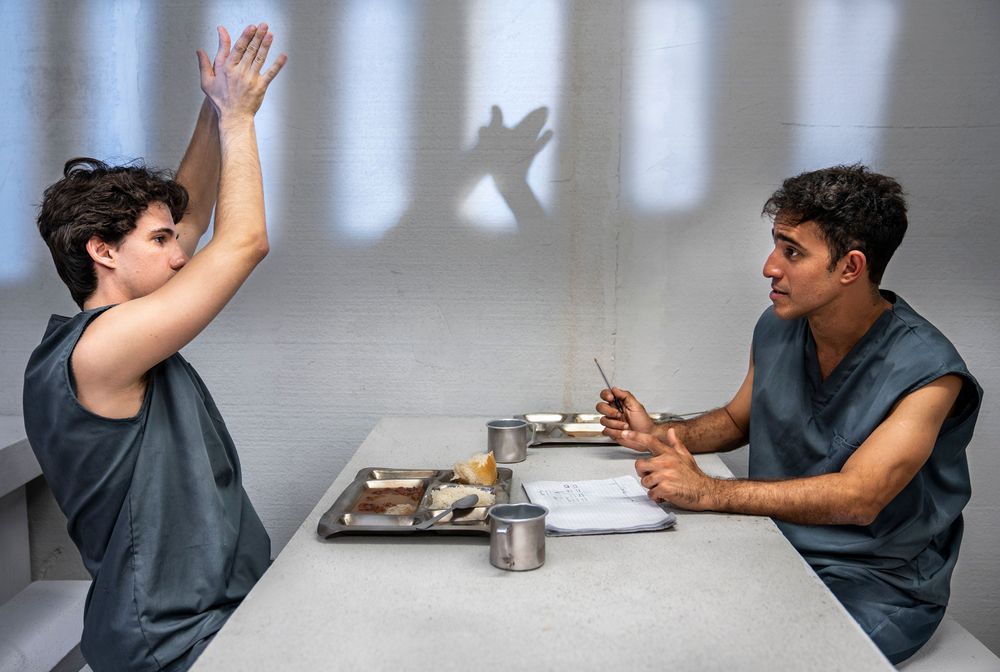OPENING NIGHT! La noche eterna (The Eternal Night)

2 Sussex Ave, Toronto, ON M5S 1J5
Sidewalk-level entrance, elevator and ramp available, door width 32 inches, no automatic doors. No accessible parking on-site. Four wheelchair accessible seats in the cinema. 15 step-free seats in row 9. Accessible gender-neutral washroom located on the 2nd and 3rd floor.
For a map to Innis Town Hall, click here
A Cuban poet has been arrested and sent to prison. There he meets a young Evangelical man from the countryside and an older actor who has been accused of trying to assassinate Fidel Castro. The actor ushers the two men into the prisoners’ social world, showing them how to resist the authorities’ attempt to re-educate them. To enliven the prisoners’ evenings, he convinces the warden that screening films would be a much more effective means of teaching inmates about the benefits of socialism. And thus, a cinema is created inside the prison.
The Eternal Night is a film based on the true story of Cuban writer and former political prisoner Néstor Díaz de Villegas. In 1974, Díaz de Villegas was sentenced to six years in prison for writing a poem. He was eighteen years old. Prior to his imprisonment, he had already been subjected to censure several times for his nonconformist attitudes, which were deemed by the revolutionary government to be ideologically divergent.
The term “ideological diversionism” was introduced by Raúl Castro in the early 1970s. It functioned as a legal and moral category that criminalized dissent. It was applied to various Cuban citizens: some who were considered to be intellectuals; youth that showed an interest in American popular culture and music; those presumed to be gay or lesbian; as well as religious people whose faith prevented them from performing political obedience. In other words, anyone who was ideologically divergent was guilty of expressing ideas outside of those sanctioned by the state. Such ideas were considered a menace to the nation and a threat to its leader’s ideological hold on the population. A hold that was essential for continuing the hegemonic status quo as it existed at that time.
Despite these circumstances, Coco Fusco’s The Eternal Night rings with the transcendent potential of imagination. It depicts the delicate dance of refusal against a regime, told through the story of three Cuban young men who were condemned for their beliefs and creations.
Please join us for a conversation with Coco Fusco following the screening.
This film was commissioned by Sharjah Art Foundation and co-commissioned by The Wapping Project. Additional support was provided by the Latinx Artist Fellowship and Anonymous Was a Woman.
Images Festival thanks the donors who supported this program: Aman Mangat, Carlos Yep, Dhruv Jain, Kunle Bristow, Nuri Sidhu, Milada Kovacova, and Scott Miller Berry.
~
La noche eterna es la historia de tres jóvenes cubanos condenados por sus creencias y sus creaciones. Trata del poder de la imaginación para trascender las circunstancias.
La película está basada en la historia real del escritor cubano y ex preso político Néstor Díaz de Villegas. En 1974, Díaz de Villegas fue condenado a seis años de prisión por escribir un poema. Tenía dieciocho años. Antes de su encarcelamiento ya había sido objeto de censura en varias ocasiones por sus actitudes inconformistas, que el gobierno revolucionario consideraba "ideológicamente divergentes". El "diversionismo ideológico", término introducido por Raúl Castro a principios de la década de 1970, funcionaba como una categoría legal y moral que criminalizaba la disidencia. Se aplicaba a los ciudadanos cubanos considerados demasiado intelectuales, a los jóvenes que mostraban interés por la cultura y la música popular estadounidense, a los presuntos homosexuales o lesbianas y a las personas religiosas cuya fe les impedía prestar obediencia política.
La historia se centra en un poeta recién llegado a la prisión, un joven campesino evangélico y un actor que fue acusado de intentar asesinar a Fidel Castro. El actor los introduce en el mundo social de los presos, mostrándoles cómo resistir el intento de reeducación de las autoridades. Para animar las tardes de los presos, convence al director de que la proyección de películas sería un medio más eficaz para enseñar a los reclusos los beneficios del socialismo y crea un cine dentro de la prisión.
Coco Fusco
Coco Fusco is an interdisciplinary artist and writer. Her works are in the permanent collection of the Museum of Modern Art, the Art Institute of Chicago, the Walker Art Center, The Centre Pompidou, the Imperial War Museum, and the Museum of Contemporary Art of Barcelona. She is a professor at Cooper Union in New York City.


